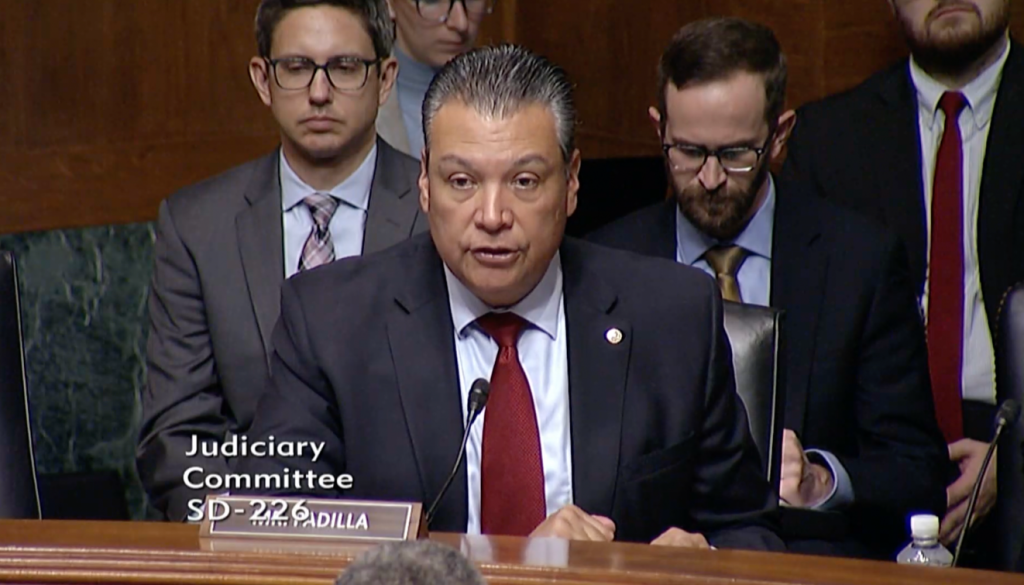Padilla Questions CEOs of Kroger and Albertsons on Impact of Proposed Merger on Consumers and Workers

WASHINGTON, D.C. — Today, U.S. Senator Alex Padilla (D-Calif.) questioned the CEOs of Kroger and Albertsons during a Senate Judiciary Committee hearing about the impacts of their planned merger on consumers, workers, and communities.
During the hearing, Padilla expressed concerns that the merger may lead to higher prices, new food deserts, and reduced access to nutritious meals, and harm to grocery workers’ jobs, benefits, and wages. Padilla questioned the CEOs’ assertion that the merging companies have big competitors already in place and that consumers would have sufficient options for affordable groceries if stores close or if prices rise due to decreased competition. Padilla also argued that with fewer open stores and less competition, consumers would pay higher prices at the register for their needs.
Padilla pressed the CEOs for more information about how their $1 billion commitment will actually increase worker wages and benefits over the next four years. In closing, Padilla emphasized the importance of timely and transparent communication with union leaders and worker representatives at all stages of the proposed merger.
Key Excerpts
- PADILLA: […] This deal has a particularly large footprint in the state of California, where the two companies operate close to 900 stores. So, needless to say, I am acutely aware and concerned about this merger. I’m concerned my constituents will experience higher prices, new food deserts, and reduced access to nutritious meals. And I’m concerned that our grocery workers risk lost jobs, reduced benefits, and suppressed wages. These concerns are nothing new. […] Now, in your testimony, you both suggest that your stores compete with premium stores like Whole Foods and Sprouts, or warehouse stores like Costco, or expensive online grocery delivery services. But, from my experience, consumers know better. Replacing the neighborhood grocery store with premium alternatives means a consumer would face a dramatic increase in the price of their basic staples, and likely the number of stops they would now need to make to buy what they need.
- PADILLA: […] I’ll tell you why they’re shopping around, because I do the same, they’re shopping around chasing what’s a better price at which other store. And so that’s the concern. With less competition, prices go up, making it harder to make your ends meet. So consumers are already experiencing this, whether it’s fruits and vegetables here, meat over there, you get the picture. […] The proposed merger announcement noted that the combined company expects to invest $1 billion to continue raising associate wages and comprehensive benefits after close, that’s a quote. So, Mr. McMullen, I’d welcome more detail about the $1 billion investment, what it will look like in practice. For example, is this a $1 billion immediate investment, or is it spread out over ten years? Is it going toward salary, health benefits, pension, all of the above? What does it mean for take-home pay for workers after the proposed merger?
- MCMULLEN: Thank you, Senator. We would expect it to be over a four-year period of time, and it’ll be a combination of pay and benefits. And if you look at what we’ve actually done, it’s been a combination of both. If you look at the benefits that we offer, it would be world class across the U.S., in terms of retirement benefits, other health care benefits, things like that, and we would expect to continue to do that, which many of our non-union competitors would not offer to the same degree.
WATCH: View video of Padilla’s Questioning
Senator Padilla is a strong advocate for corporate accountability, addressing food insecurity, and protecting workers’ rights. Earlier this month, Padilla led a letter to Kroeger CEO Rodney McMullen and Albertsons CEO Vivek Sankaran to express concerns about the impact that their proposed merger may have on California’s consumers and workforce, including higher prices for consumers at their local grocery store, suppressed wages, and other possible anticompetitive effects. On the Senate Budget Committee, Padilla pushed Congress to hold the wealthiest corporations accountable for corporate greed causing rising prices for Americans. This year, Padilla joined his colleagues in reintroducing the Nationwide Right to Unionize Act. This legislation would support the right to unionize by prohibiting states from banning union security agreements through “right-to-work” laws. As a Los Angeles City Councilmember, Padilla led the passage of a grocery worker retention ordinance.
For more information about the hearing, click here.
###